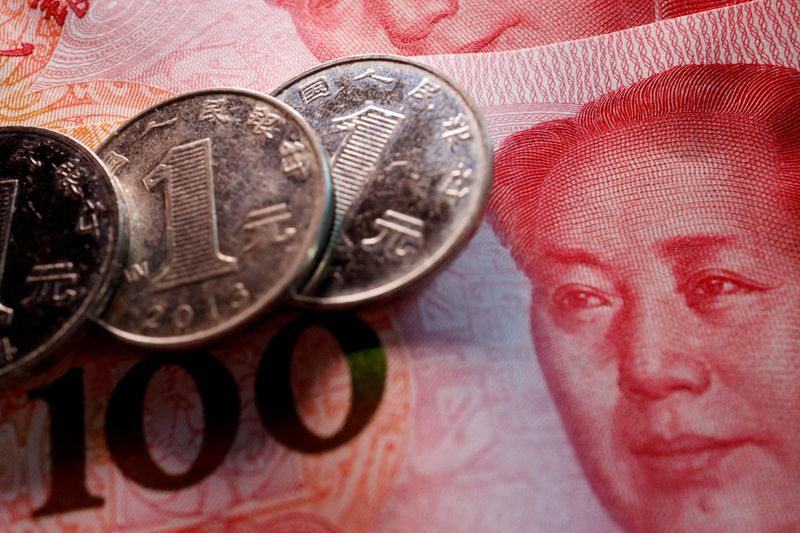SHANGHAI/HONG KONG (Reuters) - Chinese investors are rushing offshore to make dollar deposits and buy Hong Kong insurance in a signal domestic confidence is languishing and that the ailing yuan faces more pressure.
The outflows highlight deep-seated concern about the state of China's economy as its much-awaited pandemic recovery stalls. Consumer spending is flagging, the property market and stock markets are in the doldrums and cash is piling up in savings.
Brokers say individuals are responsible for the surge and it shows no sign of letting up, which analysts warn could put further pressure on the yuan as it teeters at eight-month lows.
Mainland Chinese holdings under a nascent scheme allowing investment in Hong Kong and Macau wealth products have more than doubled since the end of last year to 814 million yuan ($110 million). New premiums collected on Hong Kong insurance policies leapt a staggering 2,686% to $9.6 billion in the first quarter of 2023.
"More and more people realise they cannot put their eggs in one basket," said Helen Zhao, an insurance broker busy helping mainland clients sign Hong Kong deals, citing Sino-U.S. frictions and pessimism about China's outlook as motivating factors.
Hong Kong insurance has long been a channel for Chinese buying assets abroad, with the policies providing more protection than what's available on the mainland, and attendant savings and investment products mostly denominated in dollars with a global remit.
AIA Group (OTC:AAGIY), Prudential and Manulife all reported a jump in business, citing contributions from mainland investors.
A wealth manager at Noah Holdings (NYSE:NOAH) said he recently arranged a group of mainland clients to sign insurance contracts in "long queues", many unsettled by the abruptness of China's lurch in December from COVID-19 zero-tolerance to living with the virus.
"Some clients were a bit of shocked by the policy U-turn, and they grow pessimistic about China's economy," he said. "The burst of insurance buying in Hong Kong reflects a gloomy domestic outlook, and worries about an uncertain future."
Savings insurance products in Hong Kong offer a minimum yield of 4.5%, he said, better than 3% offered on the mainland. He requested anonymity as he isn't authorised to speak publicly.
Noah Holdings said in an emailed statement that offshore insurance is a convenient tool for global asset allocation, while Hong Kong's location makes it a natural destination for mainland investors.
Dollar deposits in Hong Kong, meanwhile, offer a hedge against movements in the yuan and, for a one-year term, yield 4%, according to Bank of China. On the mainland, one-year dollar deposits yield 2.8%, while yuan deposits yield 1.65%.
OFFSHORE DEMAND
Such returns are the pull factor. The gap between two-year U.S. and Chinese government bond yields is its widest in 16 years, in favour of the U.S., and global stocks are going up while China's are going sideways.
"Offshore demand for policies denominated in Hong Kong dollars is low – U.S. dollar-denominated policies are more prevalent, to provide access to global asset allocation," said Lawrence Lam, chief executive officer at Prudential Hong Kong.
To be sure, total demand remains below pre-COVID levels, and a surge in interest was expected to coincide with China's borders reopening, since signing policies requires a visit to Hong Kong.
Yet it comes as the yuan is looking increasingly fragile. A previous, and larger, rush of outflows in 2016 prompted Beijing to ratchet up capital controls and unveil other measures to curtail insurance buying.
The wealth manager at Noah fears that a sustained rush into Hong Kong insurance risks inviting Beijing's policy tightening.
Chinese authorities have already stepped up efforts in the last few weeks to shore up the yuan, with state banks selling dollars and the central bank warning it would guard against the risks of large exchange rate movements.
Hao Hong, chief economist at GROW Investment Group, notes the outflows also coincide with exporters' reluctance to repatriate dollar proceeds - another weight on the currency and sign of low confidence in the economy.
The yuan's real exchange rate, he points out, is below the nadir seen during China's 2015-16 stock market crash and capital flight.
While that makes for a possible source of a yuan rebound later in the year, according to Tan Xiaofen, professor at the School of Economics and Management of Beihang University, caution is likely to drive individual outflows ahead.
"We've seen some changes to the risk attitudes of mainland visitors, which has moderated to a more balanced approach to their investments," said Sami Abouzahr, head of investments and wealth solutions at HSBC in Hong Kong.
"They remain interested in investment opportunities but are also paying greater attention to their health and legacy needs through medical and legacy planning insurance solutions."
($1 = 7.2513 Chinese yuan renminbi)
